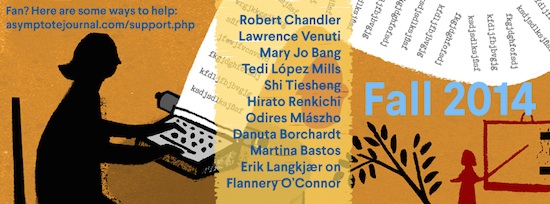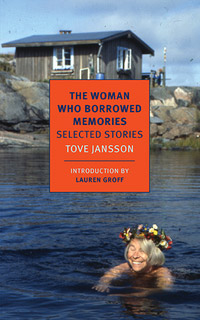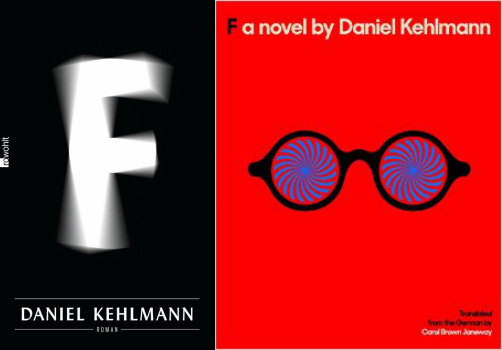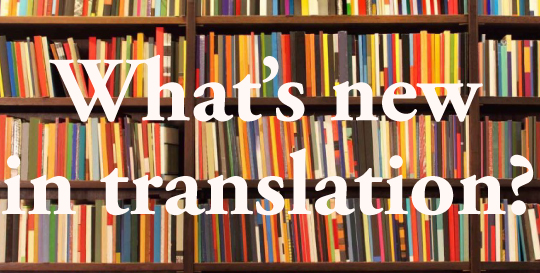Extra! Extra! Take a look at the November/December issue of the ever-venerable World Literature Today, or the latest (fifth) issue of Music & Literature hot off the press, featuring some Asymptote favorites like Norwegian phenom Stig Sæterbakken and Chinese avant-gardist Can Xue. While Music & Literature has always released a concurrent print publication, ten-year-old Internet mainstay Guernica is about to enter the world of physical print for the very first time. And while we’re at industry water-cooler chat, McSweeney’s also seems to be undergoing a shift: the publishing house/Internet Tendency/friendly lit journal has applied for nonprofit status. That “Nonprofit” denomination isn’t for nothing, either: according to Graywolf Press executive editor Jeff Shotts, the nonprofit status allows for some serious mission-driven publication.
Posts by Patty Nash
Weekly News Roundup, 17th October 2014: It’s All Dutch to Me

This week's literary highlights from across the world
The biggest news this week is Asymptote’s hot new issue launch. We know time is limited, but it’s worth taking a peak at our (best yet?) video trailer or the blog’s own highlights feature for tips on where to start (and stay tuned for even more issue coverage in the coming weeks). Really, you can’t go wrong with such a wealth of literary gems at your virtual fingertips.
Last week, the literary world was abuzz with news of its latest Nobel laureate—French writer Patrick Modiano. Perhaps “abuzz” is too misleading a term, since many English-language readers were mostly clueless as to his existence, which begs the question: what does it take for an author to be (respectably and thoroughly) translated into an English? (An aside: here’s a great primer to Modiano via Slate and pure chance). Speaking of prizes, the Man Booker’s decision to include American Anglophones in its entry pool caused quite a stir for those not of the United States, but didn’t stop Australian author Richard Flanagan from snagging the prize. Still, there are naysayers, including twice-winner and Australian author Peter Carey, who thinks the inclusion undermines the particular “Commonwealth culture” of all Anglophones outside the fifty states. Some prizes are still United States-exclusive, though, like the National Book Awards, which just released its nominations—here’s a handy guide to the nominees, via NPR. Or we could switch continents and take a look at the just-released shortlist to the “Russian” Booker.
Asymptote’s October 2014 Issue–Out Now!

Four highlights from the latest issue, including work by American Mary Jo Bang, Brazilian Paulo Scott, and Taiwanese writer Sabrina Huang
Just in time for Halloween, we welcome the launch of Asymptote’s spookiest, ghouliest issue yet! Featuring an uncanny English-language poetry feature on mythology, major contributions from the likes of Lawrence Venuti and Shi Tiesheng, an embrace of the absurd (rampaging cows, anyone? Or do you prefer a minotaur?), and some phenomenal special features, this latest issue is a must-read—and out now!
We say this every quarter, but it’s impossible (and annoying) to pick absolute favorites. So we (being your loyal blog editors, Eva Richter and Patty Nash), hedge our bets, and have selected two standouts each we really hope you check out. The list isn’t conclusive; feel free to attack our Buzzfed shortsightedness. We’re just happy to be reading.
Weekly News Roundup, 10th October 2014: The Nobel Prize, Pick-and-Choose Grammar

This week's literary highlights from across the world
First things first: here at the Roundup, we’ve been speculating about the Nobel Prize in literature for weeks—at one point or another, we had pitted Japanese surrealist Haruki Murakami and Kenyan author Ngũgĩ wa Thiong’o as the two heaviest hitters—but the 2014 Nobel Prize is an upset (isn’t it always?), going to French writer Patrick Modiano. The committee cited Modiano’s “art of memory with which he has evoked the most ungraspable human destinies and uncovered the life-world of the occupation.”
Not even in the discussion this year was American standby Philip Roth, who seems to have resigned himself to perennial snubbing: “I wonder if I had called ‘Portnoy’s Complaint’ ‘The Orgasm Under Rapacious Capitalism,’ I would thereby have earned the favor of the Swedish Academy.” Hah. This sort of snub comes as no surprise, as a famous Nobel judge claims that Western literature is being laid to waste by the big business of creative writing courses and the general tendency toward “professionalization” in literature.
Weekly News Roundup, 3rd October 2014: Bad Beginnings, But Is this the Year for Murakami?

This week's literary highlights from across the world
Beginning the weekly roundup is often, well, awkward. But I’d like to think my overtures are not quite as cringe-inducing as these ten worst openers in (English-language) literature.
On that note, if you feel like clicking away from this post to go do something more “productive,” don’t abandon your procrastination so quickly—it turns out the oft-reviled quality of procrastination isn’t so bad for you after all. Speaking of putting things off, while I personally didn’t study for the math portion of my GRE, I passed with (relatively) flying colors. Wonder why, but habits of polyglottism may have something to do with it. READ MORE…
 Isolation: that is the most powerful emotion that emanated from most of the stories in The Woman Who Borrowed Memories: Selected Stories of Tove Jansson. As I read them, breathlessly, I was plagued with that wonderful, excruciating sense of unease that radiates from a good, strong, melancholic book. It’s the tingling that comes before the numbness; that profound yet unknown sensation of loss that makes you sigh.
Isolation: that is the most powerful emotion that emanated from most of the stories in The Woman Who Borrowed Memories: Selected Stories of Tove Jansson. As I read them, breathlessly, I was plagued with that wonderful, excruciating sense of unease that radiates from a good, strong, melancholic book. It’s the tingling that comes before the numbness; that profound yet unknown sensation of loss that makes you sigh.
The stories mostly center around one protagonist and are written either in first person or a close third. Set in Scandinavian landscapes, strange and nameless cities or within the confines of a house, these stories follow the protagonists as they become locked in their own minds, detached from the world around them, either physically (the illustrator in Black-White), mentally (Aunt Gerda in The Listener) or emotionally (the sculptor in The Monkey). Often they are propelled into mysterious travel, accompanied by a stranger to whom they are instantly drawn and who highlights their own weakness (The Wolf and A Foreign City). Other times they are experiencing some undefined breakdown of their own, revealing only the symptoms, and not the cause, to the reader (as in The Storm or The Other).
Weekly News Roundup, 27th September 2014: New Gabo, Journalist Jargon

This week’s literary highlights from across the world
A few months ago, we reported on an American train company’s nostalgia-inspired plan to offer residency for certain writers, after some mused that they found they could boost productivity in transit. The company pulled through: here’s the list of the official Amtrak writers-in-residence.
Here’s an interesting twist on the lost-language trope we report on all too often at the Roundup. Language heritage advocates at Viki are enlisting the likes of über-addictive Korean soap operas and (somewhat-less-salient) Mel Gibson movies to help preserve endangered languages across the globe. And while translators are often lamented as all-too-invisible arbiters of global literature, sometimes, that invisibility may be by choice: a profile of the anonymous translator of French writer Alain Robbe-Grillet’s latest shocker, A Sentimental Novel. Meanwhile, things aren’t quite looking up yet for the publishing industry in Nigeria—but it isn’t all bad, either, and one of Spain’s most venerated writers, Javier Marías, is finally getting acknowledged in English-speaking markets (slowly, but surely). READ MORE…
Weekly News Roundup, 19th September 2014: Geniuses, References, Lots to Read!

This week's literary highlights from across the world
A big decision about net neutrality approaches for those in the United States, and it’ll do more than make Netflix more expensive. For us at Asymptote, an online publication with a large American readership, this issue really hits close to home—here’s why the net neutrality argument is important for all arts organizations. Luckily, the digital revolution has finally made amends to poetry, as e-books finally become more poet-friendly. Still, reading on a Nook or a Kindle bothers us in other ways: an e-reader gives no page numbers, so how are we supposed to cite it? Please, let’s find a better way to reference.
Don’t Trip. “Sidewalks,” by Valeria Luiselli—in Review

A look at Valeria Luiselli’s excellent essay collection Sidewalks, translated by Christine MacSweeney for Coffee House Press
Prose and I are having a moment.
I don’t mean this in the glamorously ephemeral, André-Leon-Talley sense; I mean this in the emotionally fraught, tightlipped-dinner-party sense. I just can’t seem to enjoy it as much as I have in past twenty-odd years of my life. I find myself bored by the contrivances of exposition; I roll my eyes at narrative inventiveness, and quote-unquote characters and their grievances simply exhaust me.
Weekly News Roundup, 12th September 2013: The French Boycott Scandal, Rhyming and Signing

This week's literary highlights from across the world
Bad news, optimistic readers: if a book can change your life positively, it follows that it can have the opposite effect as well (well, maybe, at least).
Neither French politicians nor French writers have ever been lauded for their discretion in the face of sex—but call it an apparition: booksellers in France are boycotting the latest juicy tell-all memoir (titled Thank you for this Moment perhaps too preemptively) by Valérie Trierweiler, spurned ex-partner of openly philandering president François Hollande. Seems as though a big issue isn’t the scandal, but the lowbrow scumminess of the whole affair—wonder what the Frankfurt School, including those German ur-critics of popular culture, Theodor Adorno and Walter Benjamin, would have to say about it. READ MORE…
Weekly News Roundup, 5th September 2014: Nobel Bets, Italian Talent Galore

This week's literary highlights from across the world
Happy September, translation friends! ’Tis the season for fall, or spring, depending on your relation to the equator (in any case, happily changing foliage awaits).
We often lament that non-English-language authors go unfairly un-translated, while their anglophone counterparts enjoy worldwide fame. Not this time: celebrated British author Martin Amis’s latest World War II novel, The Zone of Interest, will likely not appear in French or German translation. But Japanese heavyweight and writing machine Haruki Murakami is slated to publish yet another novel this coming December, hot on the heels of his latest release (at only 96 pages, this one is no IQ84). And other publishers just have to compete: here’s news of book publishers attempting to successfully pull off the ol’ “Murakami One-Two,” including Norwegian Karl Ove Knausgaard (My Struggle 3.5, thanks to Archipelago Books), and a fresh release of Chilean mastermind Roberto Bolaño’s earlier work through New Directions Press. Meanwhile, here’s an appreciation of an author I’m personally thrilled to have read in translation: Argentine all-around genius Julio Cortázar, who would be one hundred years old this month, but doesn’t read a day over yesterday. And finally, none other than Newsweek has decided to profile the hardworking and far-too-invisible people who facilitate global reading: the translators. The article features an interview with translational superstars like Edith Grossman and Natasha Wimmer.
Weekly News Roundup, 29th August 2014: Big Bucks, Howl-ing Translations

This week's literary highlights from across the world
Here are some things that might cheer you up: prizes are just the best, aren’t they? American poet (and former poet laureate) Robert Hass has snagged the 100,000-dollar Wallace Stevens Award, bucking the all-too-popular poor poet trend. And fellow Big Important Writer E. L. Doctorow wins the Library of Congress Prize for American Fiction. On the other side of the equator, Chilean writer Antonio Skármeta has won the country’s highest literary award.
Here are some unfortunate things. London-based superstar architect Zaha Hadid, who designed the stadium for the 2022 World Cup in Qatar, sues the venerable New York Review of Books for defamation regarding the work conditions of those building the familiar-looking (hmm, feminine perhaps) stadium. Often considered India’s greatest storyteller, U. R. Ananthamurthy has passed away (let’s hope we see some more of his work in English, at least posthumously!). And nomadic Irish poet Desmond O’Grady, who you might recognize from his bit in Fellini’s La Dolce Vita, has passed at age 78.
Weekly News Roundup, 22nd August 2014: PEN Awards, Don’t Kill Lawyers!

This week's literary highlights from across the world
Congratulations are in order: a virtual round of applause to the Asymptote contributors and staff lauded in the 2014 PEN Translation Fund winners: blog friend, interviewer, and invaluable assistant managing editor Eric M. B. Becker, for his translation of 2014 Neustadt winner and Mozambican author Mia Couto; and contributing editor Sayuri Okamoto for translating Japanese author Gozo Yoshimasu (“untranslatable?” ha! Just take a whiff of our January 2011 issue); former contributor Benjamin Paloff for his work with Czech writer Richard Weiner; and Philip Metres and Dmitri Psurtsev for their work with Russian writer Arseny Tarkovsky (sneak peek in our October 2012 issue). Felicitations!
Fickle Fate, Fantastic Fakery: Daniel Kehlmann’s “F”

A review of Daniel Kehlmann's "F," translated by Carol Brown Janeway
Here are the surefire steps to prevent me from reading any book.
1. Describe it as “Holden-Caulfied-meets-X.”
2. Describe it as “(insert famous author here)-ian.” Don’t get me started on the god-awful neologisms “Dickensian,” or, even worse: “Kafkaesque.”
(But sometimes hapless reviewers like myself have no choice but to commit these crimes of equivalence. And reviewing translations is especially tricky).
Not only do critics fumble when appraising prose written by a translator (as opposed to the quote-unquote “original” author), but we even stumble in the face of plot and character: clueless as to if these are culturally determined and unique to their (unknowable) contexts. Even worse for us all, thanks to an education resolutely committed to politicizing every text, we reviewers (rather stupidly) cannot help but ask: where is the equivalence? What’s the project here? What does it mean?
For this review, I read Austro-German author Daniel Kehlmann’s latest novel, F, translated into English by superstar Knopf translator Carol Brown Janeway (who also translated some of Kehlmann’s other novels: Measuring the World and Fame). And in this review—I hope you’ll forgive me—I’m terribly guilty of equivalence. I hope you’ll see why. READ MORE…


